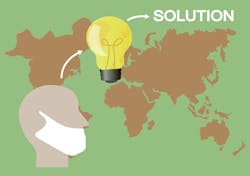Adversity has a way of creating opportunity. It is hard to argue that 2020 hasn’t been a year full of adversity. Certainly, the persistent pressure to keep costs down, to do more with less while adapting to increasing data requirements remains as valid as ever. Over the months since COVID-19 disrupted our world, new needs have emerged, including how to maintain a proper distance between people while working, supporting customers when site access is restricted, and ensuring our clients can continue providing their essential services. As we are all adapting and learning to connect with our customers, it is clear that these new demands in our business have stressed our systems as never before.
One message that has been heard repeatedly is the need to carry on with operations. As businesses, we have all been required to figure out how to keep employees and customers safe. There are few industries where this is more true than water and wastewater. In many cases, this has meant some very traditional ways of operating are not currently viable. This has created the need for change, something that has not always been easy for our industry.
Changes in the procurement and bidding process and focused development of approaches to COVID-19 tracing in sewage are great examples of the rapid innovation and change brought on by the new realities of the pandemic. Willingness, need, and investment have helped our essential services adapt and carry on. It has been encouraging to see these and countless other instances where our water community has moved fast to meet the needs of the public. In an industry that has not been historically accepting of rapid change, the question remains: how do we help our customers meet the needs of a fast-changing world as well as meet their future needs?
Looking forward, one consistent challenge in our industry is bringing new and innovative technologies to market. Of course, there is solid reasoning for this by virtue of the need to protect public health. Unfortunately, this results in hurdles to innovation that may be immediately beneficial in situations like the one we currently face. Nearly every area of the water and wastewater industry is faced with tightening budgets, but we must not lose sight of the need to support and invest in innovation. These new technologies will help us be prepared with solutions that greatly impact a future (or current) crisis.
At the time of this writing, it appears that we will endure many more months of the pandemic. It is now strangely hard to imagine working every day in the office or on a plane or in the field. While the water and wastewater industry has had a reputation for being slow moving, the opportunity to change and the need for our services has never been greater. Adapting to the lessons we have learned from the pandemic has proven that the industry does not need to be constrained by a historical tendency to be slow and risk-averse. It has proven to have a great capacity for innovation, adaptation, and responsiveness. Hopefully these lessons can serve to reduce time to market for an industry that is full of ground-breaking ideas.
Can a pandemic change the water and wastewater industry in a positive way? The answer seems to be a resounding yes. If there is anything we can learn from COVID-19 it is that we can and should adapt more quickly as an industry. WW
About the Author: Adam Neumayer is managing director at Hydro International and a member of the Water and Wastewater Equipment Manufacturers Association (WWEMA) Board of Directors. He also serves as Chair of the Association’s Investment Committee. WWEMA is a non-profit trade association formed in 1908 to represent water and wastewater technology manufacturers and related service providers. WWEMA is made up of many of the most prominent and influential companies in the industry who are working together to shape the future of water and wastewater technology in the U.S. and around the world. For more information about WWEMA, go to www.wwema.org. Interested in becoming a WWEMA member? Contact WWEMA Executive Director Vanessa Leiby at [email protected].
About the Author
Adam Neumayer
Adam Neumayer is managing director at Hydro International and a member of the Water and Wastewater Equipment Manufacturers Association (WWEMA) Board of Directors. He also serves as Chair of the Association’s Investment Committee. WWEMA is a non-profit trade association formed in 1908 to represent water and wastewater technology manufacturers and related service providers. WWEMA is made up of many of the most prominent and influential companies in the industry who are working together to shape the future of water and wastewater technology in the U.S. and around the world. For more information about WWEMA, go to www.wwema.org. Interested in becoming a WWEMA member? Contact WWEMA Executive Director, Vanessa Leiby at [email protected].
